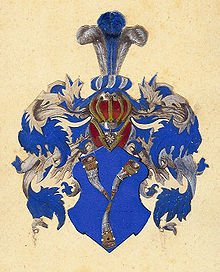
Nikolaus Ludwig, Reichsgraf von Zinzendorf und Pottendorf was a German religious and social reformer, bishop of the Moravian Church, founder of the Herrnhuter Brüdergemeine, Christian mission pioneer and a major figure of 18th-century Protestantism.

Heinrich, Count von Brühl, was a Polish-Saxon statesman at the court of Saxony and the Polish–Lithuanian Commonwealth and a member of the powerful German von Brühl family. The incumbency of this ambitious politician coincided with the decline of both states. Brühl was a skillful diplomat and cunning strategist, who managed to attain control over Saxony and Poland, partly by controlling its king, Augustus III, who ultimately could only be accessed through Brühl himself.

Count Friedrich Ferdinand von Beust was a German and Austrian statesman. As an opponent of Otto von Bismarck, he attempted to conclude a common policy of the German middle states between Austria and Prussia.

Herrnhut is a town of around 6,000 inhabitants in Upper Lusatia, in the district of Görlitz, in eastern Saxony, Germany. The town is mainly known as the place of origin of the community of the Moravian Church, and of the Moravian Stars.

The Reventlow family is a Holstein and Mecklenburg Dano-German noble family, which belongs to the Equites Originarii Schleswig-Holstein. Alternate spellings include Revetlo, Reventlo, Reventlau, Reventlou, Reventlow, Refendtlof and Reffentloff.

Wolf Heinrich Friedrich Karl Graf von Baudissin was a German diplomat, writer, and translator.

The House and Merit Order of Duke Peter Frederick Louis or proper German Oldenburg House and Merit Order of Duke Peter Frederick Louis was a civil and military order of the Grand Duchy of Oldenburg, a member state of the German Empire. The order was founded by Grand Duke Augustus of Oldenburg on 27 November 1838, to honor his father, Peter Frederick Louis of Oldenburg. It became obsolete in 1918 after the abdication of the last grand duke.
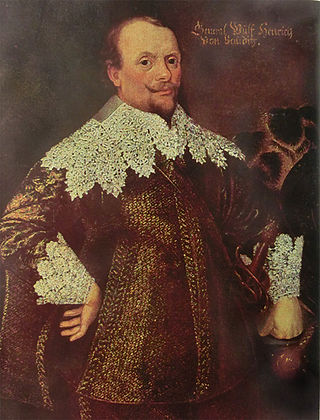
Wolf Heinrich von Baudissin or Bauditz (1579–1646) was a distinguished Protestant German cavalry commander who rose to the rank of field marshal during the Thirty Years' War.
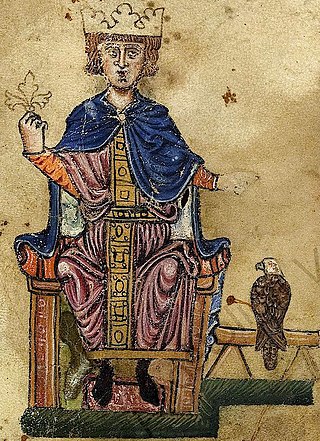
Frederick is a masculine given name meaning "peaceful ruler". It is the English form of the German name Friedrich. Its meaning is derived from the Germanic word elements frid, or peace, and ric, meaning "ruler" or "power".
Events in the year 1907 in Germany.
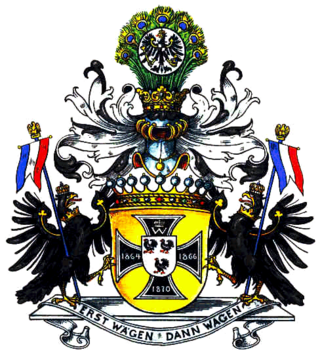
The Moltke family is an old German noble family. The family was originally from Mecklenburg, but apart from Germany, some of the family branches also resided throughout Scandinavia. Members of the family have been noted as statesmen, high-ranking military officers and major landowners in Denmark and Prussia.
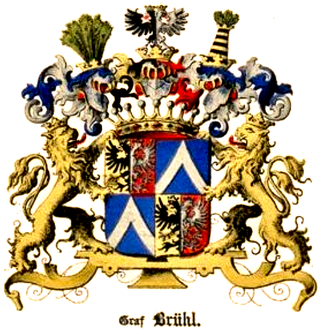
The Brühl family is an old German noble family from Saxony-Thuringia, with their ancestral seat in Gangloffsömmern in Thuringia. Branches of the family still exist today.

The House of Wedel is an old and distinguished German noble family, from Stormarn in what is now Schleswig-Holstein. The family members held the title of Prince, Count and Baron.

The House of Bülow is the name of an old German noble family with a Danish branch. Of Mecklenburg origin, its members have borne the title of Baron (Freiherr), Count (Graf) or Prince (Fürst).

Friedrich Wilhelm Graf von Bismarck was a German lieutenant general, diplomat and military writer. He wrote several major military-political works and military histories, which were very pro-Napoleon.

Adelbert Heinrich Graf von Baudissin was a German writer.
Events from the year 1820 in Germany.
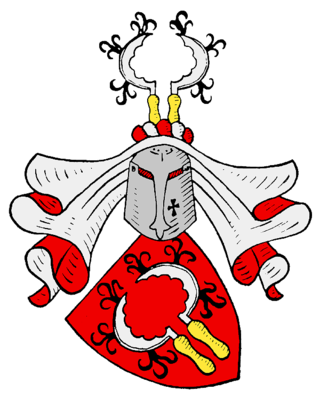
The House of Lüttichau is an old German and Danish noble family that originated from Meissen, Saxony and belongs to the High Nobility. The family has several separate noble branches, primarily from Saxony, Denmark, Austria and Braunschweig. The Lüttichau family are amongst the largest landowners in Denmark today. Males of the family carry the title Baron or Imperial Count.
Friedrich Abraham Wilhelm von Arnim-Boitzenburg, was a Prussian politician and diplomat who served as Envoy to Saxony and Denmark).
